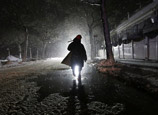
TRANSITION UNDERWAY
Analysts believe it won't be difficult for the CPC to deliver on their promise by 2020.
"By setting such a target, the CPC has sent a signal to the outside world that it will scale down its economic growth on its own initiative," said Li Yang, vice president of the Academy of Social Sciences.
Policymakers, Li said, will pay more attention to the quality of development and focus more on improving people's lives in the future.
Grim realities have forced top policymakers to lower the country's future growth, as the Chinese are more aware of the importance of protecting their environment.
A recent protest against a chemical plant that was slated to be built in China's eastern city of Ningbo in July followed a series of similar events in other cities in Sichuan and Liaoning provinces over the past two years.
Such protests have forced the ruling party to set its future governance agenda to face mounting challenges from the people, who are increasingly reluctant to sacrifice the environment for economic growth.
Hu urged CPC members to raise their ecological awareness, saying that promoting ecological progress will be a long-term task of vital importance for the people's wellbeing and China's future, as the country is facing increasing resource constraints, severe environmental pollution and a deteriorating ecosystem.
Anticipating economic difficulties this year, the authorities planned ahead early and lowered the GDP growth target for 2012 below 8 percent for the first time in eight years, in an effort to encourage local officials to pay more attention to healthy growth.
Delegates attending the 18th CPC National Congress said the readjusted economic growth goal is not only closely related to the changing environment at home and abroad, but also to the acceleration of China's economic restructuring and the promotion of quality development.
China's GDP expanded to 47.3 trillion yuan (7.5 trillion U.S. dollars) in 2011. However, widespread social problems have appeared, making the current mode of development unbalanced, uncoordinated and unsustained.
"In the past, we developed only to eliminate the shortage of goods and services. Now many sectors are suffering from overcapacity," said Shao Ning, deputy director of the State-owned Assets Supervision and Administration Commission and a delegate to the Party congress.
Prevailing ideas regarding development now concern progress in industrial upgrading and restructuring with improved quality and better performance, Shao said.
"Undoubtedly, the congress will steer China into an era of massive readjustment and great transition. We did not care too much about the consumption of resources in the past, now we must focus more on the carrying capacity of the environment," said Li Mingxing, vice chairman of the China Enterprise Confederation and a delegate to the congress.
To Song Zhiping, chairman of the China National Building Materials Group Corp. (CNBM), the Chinese economy will grow mildly during the next several years after almost two-digit growth in the past three decades, as "the larger the economy is, the harder it is to maintain growth."


















 Weekly Photos of China: Nov 5-11
Weekly Photos of China: Nov 5-11


![]()
